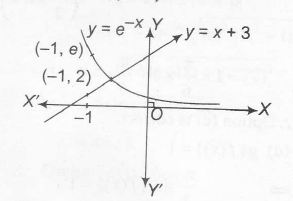Answer:
Option A,C
Explanation:
Here , (1+ex)y′+yex=1,

⇒ dydx+ex.dydx+yex=1
⇒ dy+exdy+yexdx=dx
⇒ dy+d(exy)=dx
On integrating both sides, we get
y+exy=x+C
Given , y(0)=2
⇒ 2+e0.2=0+C
⇒ C=4
∴ y(1+ex)=x+4
⇒ y=x+41+ex
Now at x=-4, y=−4+41+e−4=0
∴ y(-4)=0 ......(i)
For critical points, dydx=0
i.e, dydx=(1+ex).1−(x+4)ex(1+ex)2=0
⇒ ex(x+3)−1=0
or e−x=(x+3)
Clearly, the intersecting point lies between (-1,0)
∴ y(x) has a critical point in the interval (-1,0)